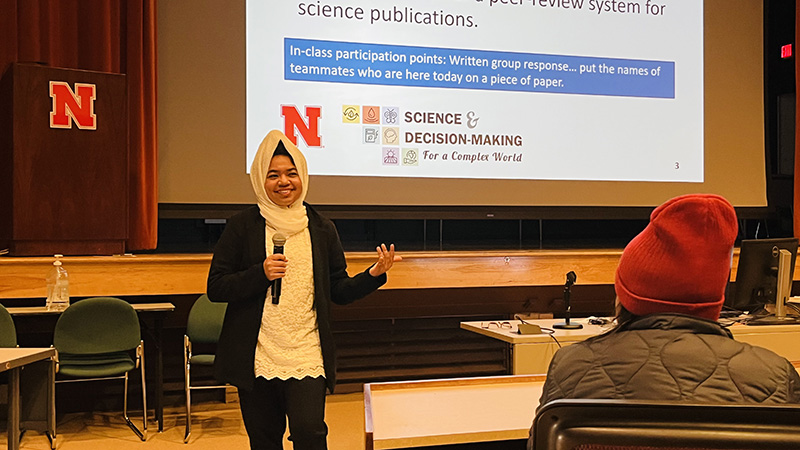Posted: 2/14/2025
Tabassum wins lay abstract competition

By Ronica Stromberg
Sumaiya Tabassum won the School of Natural Resources 2024 lay abstract competition and $500 for her abstract based on her dissertation.
The abstract, "Perspectives Through the Lens of Educators and Students: Teaching Flood Mitigation and Other Controversial Food, Energy, Water Nexus Issues in the Classroom," summed up her findings as a doctoral student researching a science literacy class with her advisor, Jenny Dauer. Dauer had taught the class, "Science and Decision-Making for a Complex World," several years. Tabassum started teaching it in January after graduating in December with her doctoral dissertation relaying findings about the class.
Tabassum researched students' and faculty members' perspectives on teaching different social-scientific issues in the science classroom. She wrote three chapters in her dissertation, and the abstract summarized all three.
"What I was trying to say is that we try to see science and society as two different entities that work in two different vacuums," she said. "So, in the science classroom, we just teach science. We don't try to bring up discussion of society or values or things like that, but that's not how the real world works."
She pointed out that when students graduate, they go into the real world and often have to make big decisions.
"We assume that they will know or learn about all those societal ethics, values and complex problems and make a decision based on their understanding, but that's just our assumption," she said. "So, it's important to bring up value-based discussions into science classrooms and talk about ethics and societal complexities. This helps students think more critically about the real-world impact of their decisions and consider how different people and factors might be impacted in different ways."
In her research, she said she and Dauer found that faculty members had low confidence in teaching complex socioscientific issues in science classes. The two designed a three-step strategy of how to teach students about controversial topics like climate change and equity.
In the first step, teachers gather the students’ perspectives on the controversial topic. In the second step, students research online about the topic and summarize what they find. In the third step, students reflect on what they first believed in comparison to what they learned.
"So, kind of not telling them what to believe, but they will find what to believe, and we will guide their learning," Tabassum said.
The result of this learning strategy was positive, she said, and she and Dauer developed an "equity perspective framework" for classroom use. Using it, teachers can separate students' views on equity in social-scientific issues into three types: Critically Analyzing Power and Systemic Inequity, Emphasizing Benefits Overlooking Context, and Individual Fairness and Freedom.
"That framework would be useful when people are trying to understand what perspective people bring when they think about equity and how they approach that thinking," Tabassum said.
When she uses the terms values and equity, she said she is thinking about people who have been marginalized or left behind and what can be done to improve their lives. For example, on an issue like flood mitigation, she said her value would be to consider those people who have probably been hurt most by flooding because they’ve been marginalized and living on less desirable land that's prone to flooding. Those people need to be included in scientific discussions about what causes flooding and what can be done about it, she said.
Her first chapter of her dissertation was published in Journal of Environmental Studies and Sciences in January. She stated plans to submit the other two chapters for publication this semester.
She said 2024 was a “roller coaster” for her with a new baby and all of her academic work but she was happy to receive the award and it boosted her confidence.
"I feel like a lot has happened in my life in this one year, which is so hard to summarize, but I published a paper, submitted and completed my PhD, won this award, started working as a postdoc and started working as the instructor, leading the class," she said. "So, I'm grateful for everything."
The SNR Graduate Committee began the lay abstract competition in 2023 to encourage graduate students to write abstracts understandable to the general public.
"No matter what career paths our students take, they will end up having to explain to someone outside their field what they do and why it's important," said Robert Zink, the professor serving as the lay abstracts coordinator. "A lay abstract, now standard in many journals, is something we rarely teach students how to do, mostly because professors themselves have had no training. I see lay abstracts as something we can post on UNL websites so that donors, politicians or any interested people can appreciate the great things our graduate students are doing."
Winning abstracts are posted at https://snr-gsa.unl.edu/information/lay-abstracts-theses-and-dissertations/.
